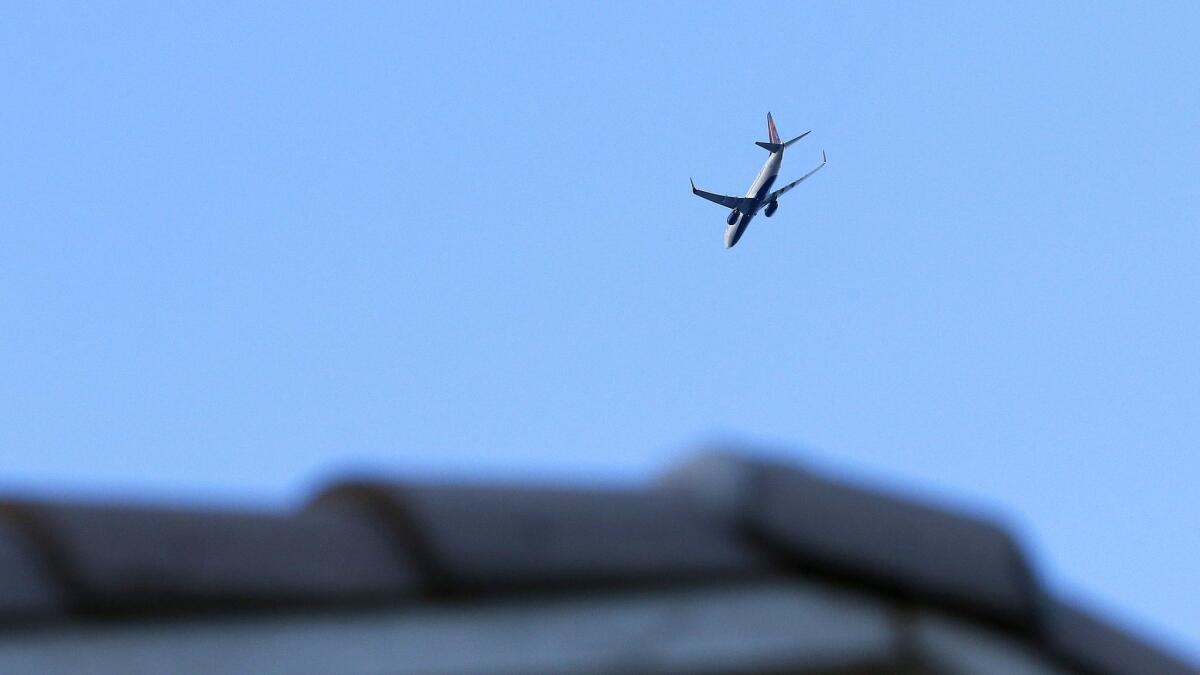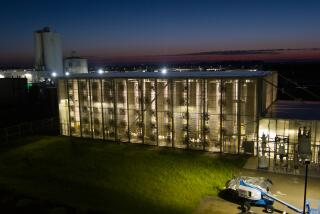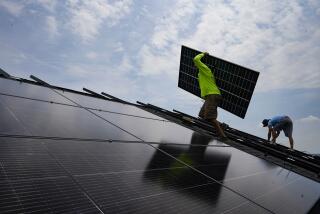Op-Ed: My airline gold status should come with a carbon tax

I will soon earn “gold status” for life on a major airline. I’ll be eligible for seats with extra legroom, the opportunity to board planes while there’s hope of finding overhead storage, and other perks. I’m ecstatic but also remorseful, because to achieve this dubious milestone, I will have flown 1 million miles.
My daily life leaves a modest carbon footprint (I walk to work, eat a lot of plants, live in a modest town house that requires little heat or air conditioning), but my life in the air is gross and extravagant. Every time I fly economy from LAX to Sydney, Australia, and back, I release an estimated 1.31 metric tons of climate-heating carbon dioxide into the atmosphere. For such a ticket I’ve recently paid less than $1,000.
Flying 1 million miles in economy makes me personally responsible for at least 254 metric tons of emissions. Compare this with the average annual carbon footprint of an American — about 16.5 metric tons per person. Am I an eco-criminal?
We justify our travel by the net benefits we believe we produce.
In fact, I am a field biologist and conservation scientist. While I do fly for occasional holidays and vacations, nearly all of my travel is for work. I travel throughout the world to teach, conduct field research, attend workshops, share my discoveries at conferences, and give public and university talks. I know collaboration can happen over the internet and I’ve written many papers with people and consulted with conservation scientists that way. But new ideas emerge more naturally in a face-to-face discussion while walking through the habitats we’re dedicated to conserving, or when talking late into the evening over dinner and drinks. On trips like this I’ve become part of a global network of like-minded conservation biologists, and I believe outcomes for wildlife have improved because of these interactions.
At the same time, I have to acknowledge that climate change is driving hurricanes like Katrina, Harvey and Maria, as well as firestorms such as the Thomas, Camp and, in my backyard, Woolsey fire. It’s causing sea level rise and droughts and is killing coral reefs and driving species toward extinction. These are, in part, the cumulative impacts of a small segment of the human population that is particularly profligate in its consumption fossil fuels, releasing unprecedented amounts of CO2 and other greenhouse gases into the atmosphere. People like me.
When I raise the air travel quandary with other conservation scientists (many of whom travel even more than I do), I’ve been greeted by, “Well, um, it’s important to share our knowledge.” We justify our travel by the net benefits we believe we produce. And for some, this is certainly true. Jane Goodall’s inspirational messages about peace, wildlife conservation, and human and animal welfare is undeniably connected to her lifetime of travel.
There are some moves to tamp down academic and business travel. For instance, some academic institutions now refuse to pay for flights if the destination can be reached by train in under six hours. Of course that strategy works much better in Europe, and potentially in the Eastern U.S., than in the American West. UCLA adds an environmental fee on many flights to fund an internal competitive sustainability grant fund. This is an innovative idea, but alone insufficient.
If we want to keep traveling across continents and oceans, we have to immediately reduce the climate change impacts of air travel. A carbon tax — a government-mandated surcharge on anything that produces greenhouse gasses — is the only way to spur the drastic change needed.
A carbon tax would take into account all the environmental costs of air travel. That includes much more than simply jet fuel; it also would have to encompass the cost of mining the metals for planes, building airports, launching navigation satellites, etc. Carbon tax models vary wildly. A recent U.N. climate change report showed anywhere from $135 (in 2010 US dollars) to $6,050 per metric ton to keep global temperature increases below the 1.5-degree-Celsius goal. This would drive up the price of my Sydney-to-LAX ticket by a modest $177 or a whopping $7,925. Clearly, airline tickets would cost more, potentially much more, for a while.
Enter the Fray: First takes on the news of the minute from L.A. Times Opinion »
A carbon tax needs to be high enough to drive airlines to become greener — and quickly — but not so high that it kills the industry. Airlines might start by directly purchasing CO2 offsets from companies that have created technologies to remove carbon from the atmosphere for $100 to $200 a ton. Production of renewable fuels, such as algae-based diesel, might become viable and readily available if carbon taxes are higher. At least one company is working to produce jet fuel from carbon removed from the air. Importantly, by making these products economically competitive with fossil fuels, a carbon tax supports the development and scaling up of technologies from which we will all benefit.
I want to continue to fly. Indeed, I wrote the first draft of this essay on a plane. I want to be able to explore — and work to save — some of the Earth’s biodiversity. I want to meet colleagues around the world. We live in a golden age of interconnectedness and I genuinely believe many good things emerge from this.
But I want future generations to have those opportunities too. So I know I need to start paying a carbon tax on my plane tickets now.
Daniel T. Blumstein is a professor in the ecology and evolutionary biology department and the Institute of the Environment and Sustainability at UCLA. He co-edited “Ecotourism’s Promise and Peril: A Biological Evaluation.”
Follow the Opinion section on Twitter @latimesopinionand Facebook
More to Read
A cure for the common opinion
Get thought-provoking perspectives with our weekly newsletter.
You may occasionally receive promotional content from the Los Angeles Times.






